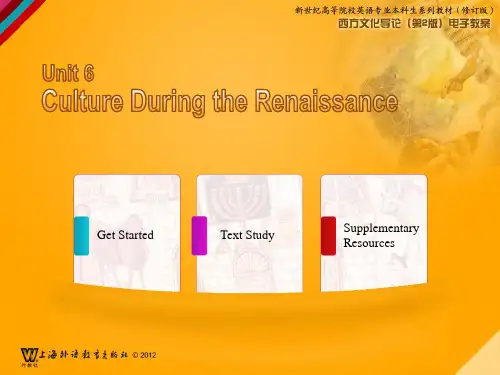西方文化导论(英文)
- 格式:ppt
- 大小:619.50 KB
- 文档页数:74

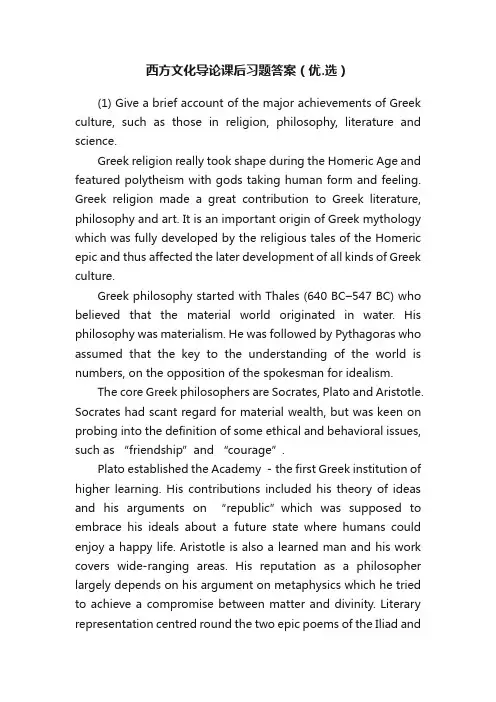
西方文化导论课后习题答案(优.选)(1) Give a brief account of the major achievements of Greek culture, such as those in religion, philosophy, literature and science.Greek religion really took shape during the Homeric Age and featured polytheism with gods taking human form and feeling. Greek religion made a great contribution to Greek literature, philosophy and art. It is an important origin of Greek mythology which was fully developed by the religious tales of the Homeric epic and thus affected the later development of all kinds of Greek culture.Greek philosophy started with Thales (640 BC–547 BC) who believed that the material world originated in water. His philosophy was materialism. He was followed by Pythagoras who assumed that the key to the understanding of the world is numbers, on the opposition of the spokesman for idealism.The core Greek philosophers are Socrates, Plato and Aristotle. Socrates had scant regard for material wealth, but was keen on probing into the definition of some ethical and behavioral issues, such as “friendship”and “courage”.Plato established the Academy -the first Greek institution of higher learning. His contributions included his theory of ideas and his arguments on “republic”which was supposed to embrace his ideals about a future state where humans could enjoy a happy life. Aristotle is also a learned man and his work covers wide-ranging areas. His reputation as a philosopher largely depends on his argument on metaphysics which he tried to achieve a compromise between matter and divinity. Literary representation centred round the two epic poems of the Iliad andthe Odyssey, lyrical poetry by Sappho and Pindar and drama by Aeschylus, Euripides and Aristophanes. Their works combined Greek myths and social life and won much appreciation and enthusiasm from the public.In science the mathematician Euclid established plane geometry and Archimedes discovered the ratio of radius of a circle and the relationship between the volume and surface of a sphere.(2) What do you think of the influence Greek culture has exerted on Western civilization as a whole? Give examples.Greek culture is often termed the cradle of the Western civilization and has had an enormous impact on Western culture. The specific contributions are found in the areas of philosophy, politics, literature, art, science and architecture.Greek politics was one of the greatest influences on the Western civilization. The Greeks were the first to successfully create a government based on the consensus of the people and thus provided a foundation for Western democracy.The second significant influence was that of philosophy. The Socratic idea about ethics and knowledge helped the Westerners care more for the effect of knowledge and value of morality, both of which give sound guidance to people in the later years to improve and change the world outside themselves, i.e., human society and the natural world.Later generations of Westerners have benefited a lot from Greek culture, such as those in painting, sculpture, architecture, drama, poetry and historical works. Classicism had Greek culture as one of the crucial sources, and this has helped Westerners so much that they ascribed the origin of the Renaissance to it. This changed the intellectual conditions of the later medieval periodand opened the way to the modern era in the West.Chapter 21. Tell briefly the major characteristics and contributions of Roman culture, as are demonstrated in religion, poetry, history and architecture.In the early period, Roman culture often depended heavily on the introduction and imitation of other cultures, particularly, Greek culture. Thus Romans created their own powerful culture, laying the foundation for subsequent Western culture in many fields. According to Greek culture and others’ culture; they created their own gods and myth, In poetry, ancient Rome made brilliant achievements,Livy was responsible for the great History of Rome in 142 volumes. His work has always been cited by later statesmen, writers or scholars,The architecture of Ancient Rome adopted the Greek style for its own purposes, but the Romans also developeda new kind.2. In what sense do you think Roman culture owed its accomplishments to the benefits obtained from Greek culture? Give examples.Roman culture learned and inherited a lot from Greek culture.,religion, philosophy and literature. In religion, Rome had its own system of beliefs which had been simple and could hardly compare with the plurality of Greek religion. The same is true of Roman philosophy where we could find examples ,In literature, Roman men of letters also borrowed a All in all, the two cultures are closely linkedgreat deal from Greek culture.Chapter 31. How was the Jewish civilization developed after a tortuous history of split and unification? The major explanation for thedevelopment of the Jewish civilization is its strong cohesiveness and vitality,they put into effect their Judaist beliefs and what they read of Judaist scriptures.From then on Jews have begun to become aware of the necessicity to liberate themselves from the restrictive laws and acquire new knowledge and modern ideas from the Europeans, Most of Jews thus received a good education, fully armed with cultural and scientific knowledge and did well in their own position they could quickly turn it into a well developed nation in spite of its small size and small population .2.Say something about Judaism and The Old Testament.The Old Testament is the Judaist Bible. It was written in Hebrew, including the three parts:Pentateuch, Prophets and Hagiographa and Apocrypha. After The Old Testament was translated into Greek by Jewish scholars,many westerners began to understand Judaism by reading this book. It is not only of religious value but also of literatry value.Chapter 41. What are the main components of Christianity and why could it be accepted as the official religion first by the Roman Empire and then by the following kingdoms or empires in Europe?(1)The main components of Christianity are :1) The Bible as the only Christian scripture;Major Christian doctrines about Trinity and Redemption;3) Other doctrines or events of Christianity:(2 )Christianity is accepted and popular in Europe because of these factors:1).For the common people in the empire ,they needed something to fill up their spiritual vacuum. Christianity could play such a role.2). It could work together with any secular regimes to offer necessary assistance.3). The name and influence of Christiaity would be a symbol of sacredness and justification,4) Christianity is also a kind of culture, it could be tolerated because their life and propertycould thus be secured in the changed circumstances.2. What are the basic differences between Christianity and Judaism?In spite of the fact that the two religions derived from Jewish culture, there are some basic differences between them.First is the different image of God.Second is different view of God. Jehovah is viewed He is like fire or wind .God is kinder and more helpful, Third is the different position each religion is located in and hence would make different contribution. Fourth is Jehovah was important to Jews only in theory and affect them in spirit occasionally while Christianity moved into secular life for the Westerner as Pope and churches became very powerful .Chapter 61.Tell simply the background and development of the Renaissance.It was no accident that it first occurred in Florence and Italy where the early signs of capitalism had appeared at the same time as social chaos, political disputes and military clashes , more and more people began to suspect the justification for those who held the power,Painting and sculpture were the first area to reflect the change of subjects and tastes.(2) What are the major features and achievements of the Renaissance? Give examples.The Renaissance is characterised by seeking ideologicalemancipation, intellectual freedom and political awareness, based on cultural production and religious reformation. All these were undertaken or unfolded gradually but widely, extending its influences to every corner of Europe, with more and more people getting involved.The achievements were seen principally in six areas, namely, painting, sculpture, poetry, fiction, drama and religious reformation as well as the change in the cultural and intellectual climate. Instances could be located in these areas, such as the huge change of subjects and styles in painting. The medieval painting used to centre on depicting Jesus Christ and other Christian subjects, not only effecting similar and the limited subject matter, but also depicting stylistically facial expressions and manners. The great artists in the Renaissance started to focus on the images with individualistic temperament, highlighting humanity instead of divinity, thus breaking away from the medieval frozen models and linking classicalism with human nature as the centre of their representational work.最新文件---------------- 仅供参考--------------------已改成word文本--------------------- 方便更改。


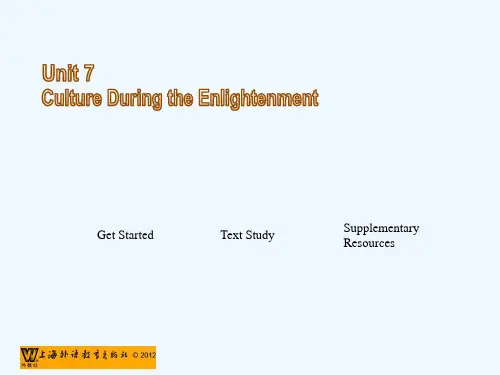
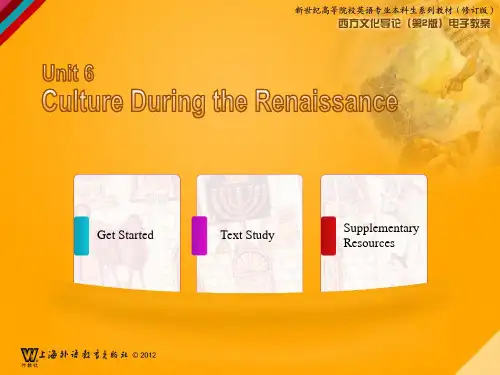
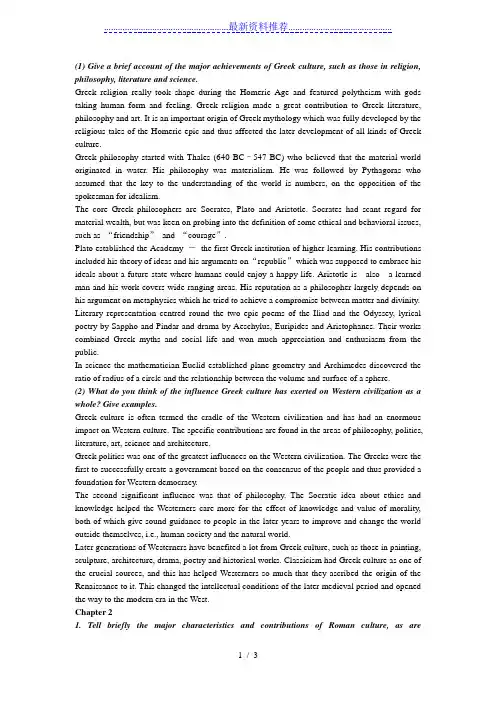
(1) Give a brief account of the major achievements of Greek culture, such as those in religion, philosophy, literature and science.Greek religion really took shape during the Homeric Age and featured polytheism with gods taking human form and feeling. Greek religion made a great contribution to Greek literature, philosophy and art. It is an important origin of Greek mythology which was fully developed by the religious tales of the Homeric epic and thus affected the later development of all kinds of Greek culture.Greek philosophy started with Thales (640 BC–547 BC) who believed that the material world originated in water. His philosophy was materialism. He was followed by Pythagoras who assumed that the key to the understanding of the world is numbers, on the opposition of the spokesman for idealism.The core Greek philosophers are Socrates, Plato and Aristotle. Socrates had scant regard for material wealth, but was keen on probing into the definition of some ethical and behavioral issues, such as “friendship”and “courage”.Plato established the Academy -the first Greek institution of higher learning. His contributions included his theory of ideas and his arguments on “republic”which was supposed to embrace his ideals about a future state where humans could enjoy a happy life. Aristotle is also a learned man and his work covers wide-ranging areas. His reputation as a philosopher largely depends on his argument on metaphysics which he tried to achieve a compromise between matter and divinity. Literary representation centred round the two epic poems of the Iliad and the Odyssey, lyrical poetry by Sappho and Pindar and drama by Aeschylus, Euripides and Aristophanes. Their works combined Greek myths and social life and won much appreciation and enthusiasm from the public.In science the mathematician Euclid established plane geometry and Archimedes discovered the ratio of radius of a circle and the relationship between the volume and surface of a sphere.(2) What do you think of the influence Greek culture has exerted on Western civilization as a whole? Give examples.Greek culture is often termed the cradle of the Western civilization and has had an enormous impact on Western culture. The specific contributions are found in the areas of philosophy, politics, literature, art, science and architecture.Greek politics was one of the greatest influences on the Western civilization. The Greeks were the first to successfully create a government based on the consensus of the people and thus provided a foundation for Western democracy.The second significant influence was that of philosophy. The Socratic idea about ethics and knowledge helped the Westerners care more for the effect of knowledge and value of morality, both of which give sound guidance to people in the later years to improve and change the world outside themselves, i.e., human society and the natural world.Later generations of Westerners have benefited a lot from Greek culture, such as those in painting, sculpture, architecture, drama, poetry and historical works. Classicism had Greek culture as one of the crucial sources, and this has helped Westerners so much that they ascribed the origin of the Renaissance to it. This changed the intellectual conditions of the later medieval period and opened the way to the modern era in the West.Chapter 21. Tell briefly the major characteristics and contributions of Roman culture, as aredemonstrated in religion, poetry, history and architecture.In the early period, Roman culture often depended heavily on the introduction and imitation of other cultures, particularly, Greek culture. Thus Romans created their own powerful culture, laying the foundation for subsequent Western culture in many fields. According to Greek culture and others’ culture; they created their o wn gods and myth, In poetry, ancient Rome made brilliant achievements,Livy was responsible for the great History of Rome in 142 volumes. His work has always been cited by later statesmen, writers or scholars,The architecture of Ancient Rome adopted the Greek style for its own purposes, but the Romans also developed a new kind.2. In what sense do you think Roman culture owed its accomplishments to the benefits obtained from Greek culture? Give examples.Roman culture learned and inherited a lot from Greek culture.,religion, philosophy and literature. In religion, Rome had its own system of beliefs which had been simple and could hardly compare with the plurality of Greek religion. The same is true of Roman philosophy where we could find examples ,In literature, Roman men of letters also borrowed a All in all, the two cultures are closely linkedgreat deal from Greek culture.Chapter 31. How was the Jewish civilization developed after a tortuous history of split and unification? The major explanation for the development of the Jewish civilization is its strong cohesiveness and vitality,they put into effect their Judaist beliefs and what they read of Judaist scriptures.From then on Jews have begun to become aware of the necessicity to liberate themselves from the restrictive laws and acquire new knowledge and modern ideas from the Europeans, Most of Jews thus received a good education, fully armed with cultural and scientific knowledge and did well in their own position they could quickly turn it into a well developed nation in spite of its small size and small population .2.Say something about Judaism and The Old Testament.The Old Testament is the Judaist Bible. It was written in Hebrew, including the three parts:Pentateuch, Prophets and Hagiographa and Apocrypha. After The Old Testament was translated into Greek by Jewish scholars,many westerners began to understand Judaism by reading this book. It is not only of religious value but also of literatry value.Chapter 41. What are the main components of Christianity and why could it be accepted as the official religion first by the Roman Empire and then by the following kingdoms or empires in Europe?(1)The main components of Christianity are :1) The Bible as the only Christian scripture;Major Christian doctrines about Trinity and Redemption;3) Other doctrines or events of Christianity:(2 )Christianity is accepted and popular in Europe because of these factors:1).For the common people in the empire ,they needed something to fill up their spiritual vacuum. Christianity could play such a role.2). It could work together with any secular regimes to offer necessary assistance.3). The name and influence of Christiaity would be a symbol of sacredness and justification,4) Christianity is also a kind of culture, it could be tolerated because their life and property could thus be secured in the changed circumstances.2. What are the basic differences between Christianity and Judaism?In spite of the fact that the two religions derived from Jewish culture, there are some basic differences between them.First is the different image of God.Second is different view of God. Jehovah is viewed He is like fire or wind .God is kinder and more helpful, Third is the different position each religion is located in and hence would make different contribution. Fourth is Jehovah was important to Jews only in theory and affect them in spirit occasionally while Christianity moved into secular life for the Westerner as Pope and churches became very powerful .Chapter 61.Tell simply the background and development of the Renaissance.It was no accident that it first occurred in Florence and Italy where the early signs of capitalism had appeared at the same time as social chaos, political disputes and military clashes , more and more people began to suspect the justification for those who held the power,Painting and sculpture were the first area to reflect the change of subjects and tastes.(2) What are the major features and achievements of the Renaissance? Give examples.The Renaissance is characterised by seeking ideological emancipation, intellectual freedom and political awareness, based on cultural production and religious reformation. All these were undertaken or unfolded gradually but widely, extending its influences to every corner of Europe, with more and more people getting involved.The achievements were seen principally in six areas, namely, painting, sculpture, poetry, fiction, drama and religious reformation as well as the change in the cultural and intellectual climate. Instances could be located in these areas, such as the huge change of subjects and styles in painting. The medieval painting used to centre on depicting Jesus Christ and other Christian subjects, not only effecting similar and the limited subject matter, but also depicting stylistically facial expressions and manners. The great artists in the Renaissance started to focus on the images with individualistic temperament, highlighting humanity instead of divinity, thus breaking away from the medieval frozen models and linking classicalism with human nature as the centre of their representational work.。
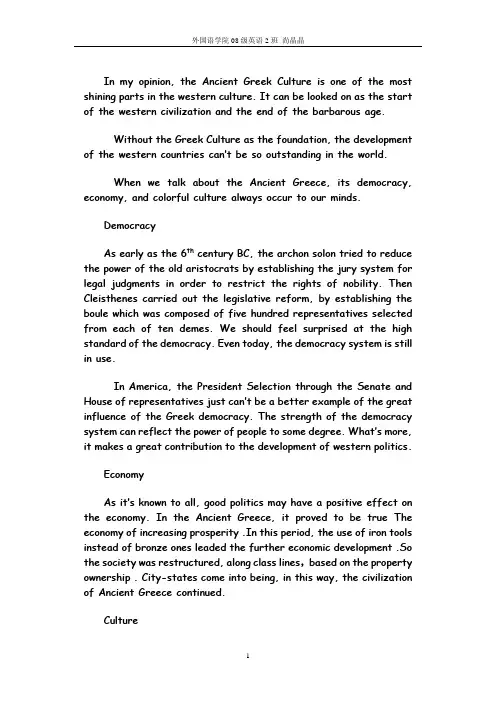
In my opinion, the Ancient Greek Culture is one of the most shining parts in the western culture. It can be looked on as the start of the western civilization and the end of the barbarous age.Without the Greek Culture as the foundation, the development of the western countries can’t be so outstanding in the world.When we talk about the Ancient Greece, its democracy, economy, and colorful culture always occur to our minds.DemocracyAs early as the 6th century BC, the archon solon tried to reduce the power of the old aristocrats by establishing the jury system for legal judgments in order to restrict the rights of nobility. Then Cleisthenes carried out the legislative reform, by establishing the boule which was composed of five hundred representatives selected from each of ten demes. We should feel surprised at the high standard of the democracy. Even today, the democracy system is still in use.In America, the President Selection through the Senate and House of representatives just can’t be a better e xample of the great influence of the Greek democracy. The strength of the democracy system can reflect the power of people to some degree. What’s more, it makes a great contribution to the development of western politics.EconomyAs it’s known to all, good politics may have a positive effect on the economy. In the Ancient Greece, it proved to be true The economy of increasing prosperity .In this period, the use of iron tools instead of bronze ones leaded the further economic development .So the society was restructured, along class lines,based on the property ownership . City-states come into being, in this way, the civilization of Ancient Greece continued.CultureIt’s generally acknowledged that the Greek Culture is the most precious treasure left not only for Europe but also for the whole world.It falls into four categories, namely the Greek mythology and religion, the Greek art and science, the Greek literature, and the Greek philosophy.i.Greek mythologyAre you familiar with these names, such as Zeus, Athena, Apollo. They are the names of some major gods in the Greek mythology. According to Karl Marx, the Greek mythology is not only a treasure house, but also the soil for Greek art.So it’s certain that the religious tales became fully developed myths and thus contributed a lot to the later development of Greek art.In the Greek mythology, we can find numerous characteristics in the gods and goddesses. Sometimes we may find many tales reflected the feature and life of human beings.ii.Greek art and scienceWe can’t ignore the Greek art and science achievements because they are so amazing. Towards us, they’re so important in fully understanding the Greek Culture. The Greek art is made up of three main parts, they’re architecture, sculpture, and painting.You can find noble simplicity and calm grandeur from the greatest building in Athens, the Parthenon. In addition, you can also find the kindred art of vase decoration which will make you astonished.Then what about the science? As we know, the Greeks did three biggest things: astronomy, philosophy, and democracy. We can draw a conclusion that the geography, astronomy, and mathematics achievements were all remarkable.In this period, there’re some prestigious scholars. Pytheasapplied his solid scientific training primarily to geography. Hipparchus, he perfected measuring instruments and calculated the movements of stars .Another ever greater achievements are in mathematics and physics. The best known mathematician was Euclid who established the science of plan geometry. The other familiar name is Archimedes who discovered the principle of floatation and lever. His famous words “Give me a piece to stand, I will move the earth” impressed me most.iii.Greek literature and historyThe Greek literature is well-established for its epic, lyrical poetry, and drama. The most out-standing epics are Odyssey and Iliad written by Homer. The Trojan War takes up the most part. So we can see the epics related with the history. The person who is “the father of history” na med Herodotus. With his book Histories, which deals with the Persian Wars.Thanks to their works, we can fully witness what has happened during this time.iv.Greek philosophyWhen we talk about “Platonic Love”, we can think of the famous Plato, besides his teacher Socrates.Socrates had a reputation for irony and a sense of humor. And in my view, the Republic is his representative. In this work, Plato built up an ideal kingdom for us, his thoughts made much influence on the followers.Have you heard abou t “I love my teacher, but I love science more”. This is from Aristotle, he was regarded as the greatest thinker and most learned person of ancient times. His works cover wide ranging areas including philosophy, psychology, logic, rhetoric, literary, etc. His thoughts were completely different from Plato. He was a materialist. He indeed made great contribution to the Greek philosophy.Owing to this class: “Western Culture Introduction”, it makes megain a good knowledge of Greek Culture. We marvel at so many wonderful achievements made by the people in the old times. Meanwhile, I believe we can benefit a lot from the Greek Culture, and treasure it forever.。
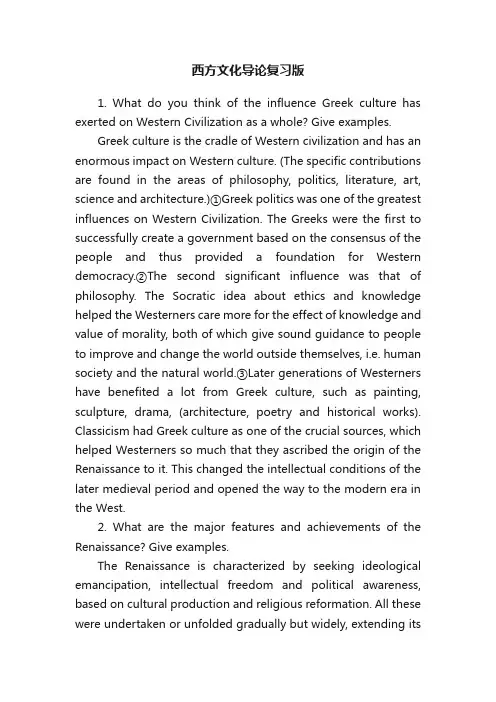
西方文化导论复习版1. What do you think of the influence Greek culture has exerted on Western Civilization as a whole? Give examples.Greek culture is the cradle of Western civilization and has an enormous impact on Western culture. (The specific contributions are found in the areas of philosophy, politics, literature, art, science and architecture.)①Greek politics was one of the greatest influences on Western Civilization. The Greeks were the first to successfully create a government based on the consensus of the people and thus provided a foundation for Western democracy.②The second significant influence was that of philosophy. The Socratic idea about ethics and knowledge helped the Westerners care more for the effect of knowledge and value of morality, both of which give sound guidance to people to improve and change the world outside themselves, i.e. human society and the natural world.③Later generations of Westerners have benefited a lot from Greek culture, such as painting, sculpture, drama, (architecture, poetry and historical works). Classicism had Greek culture as one of the crucial sources, which helped Westerners so much that they ascribed the origin of the Renaissance to it. This changed the intellectual conditions of the later medieval period and opened the way to the modern era in the West.2. What are the major features and achievements of the Renaissance? Give examples.The Renaissance is characterized by seeking ideological emancipation, intellectual freedom and political awareness, based on cultural production and religious reformation. All these were undertaken or unfolded gradually but widely, extending itsinfluences to every corner of Europe, with more and more people getting involved.The achievements were seen principally in six areas, namely, painting, sculpture, poetry, fiction, drama and religious reformation. Instances can be found in these areas , such as the huge change of subjects and styles in painting. The medieval painting used to center on depicting Jesus Christ and other Christian subjects, not only effecting similar and limited subjects but also depicting typical facial expressions and manners. The great artists in the Renaissance started to focus on the images with individualistic temperament, highlighting humanity instead of divinity, thus breaking away from stereotyped medieval models.3. Say something about the features and contributions of utilitarianism, utopian socialism and classical economics.Utilitarianism is the idea that the moral worth of an action is determined by its contribution to overall utility, That is, its contribution to the calculation of pleasure and gain one can have as a result of that action. The calculation is not just material, but spiritual or moral. Utilitarianism provides the motivation and condition for an action of any kind, either individual or collective, and offers the principle for making laws to ensure justice and equality required of a society.Utopian socialism refers to the beliefs held by early socialists, who created hypothetical visions of perfect egalitarian and communalist societies without practical consideration of actual conditions of the capitalist society they lived in and thus could not carry out their ideals due to the powerful hindrance. However some of the Utopianideals, such as those about women's equality andemancipation, were reasonable and consequently absorbed by Marxism.Classical economist is widely regarded as the beginning of modern economic thoughts. It is the idea that a free market can regulate itself. Its founders include Adam Smith, David Ricardo, Thomas Malthus and John Stuart Mill. Adam Smith’s The Wealth of Nations in 1776 is considered to mark the beginning of classical economics.4. Give a general survey of the intellectual and ideological developments in Europe by focusing on one or two theoretical schools in the following list: positivism, pragmatism, intuitionalism, psychoanalysis, existentialism, logical atomism, logical positivism and naturalist philosophy.Existentialism is an important school of thought in the modern age. It is a term that has been used in the work of 19th and 20th century philosophers among whom are Soren Aabye Kierkegaard, Karl Jaspers, Martin Heidegger and Jean-Paul Sartre. Despite the doctrinal differences and disagreements among them, they all take the human subject and the condition of existence as a starting point for philosophical exploration.Existential philosophy begins with a sense of confusion in the face of an absurd world. Many existentialists regard traditional philosophy, in both style and content, as too abstract and remote from concrete human experiences. Existentialism has exerted its influence upon Western literature in terms of providing the philosophical basis for the emergence of the “theatre of the absurd” in the field of play.5. Try to recall how Chinese popular culture came into fashion in the last 2 or 3 decades with the introduction of western pop music and art.Chinese popular culture came into fashion in the early 1980s along with China's opening up to the outside world. There emerged many popular singers among whom are Deng Lijun, Mao Amin, etc. Cui Jian deserves credit for his contribution to C hina’s rock music, being the first musician of the genre. Now Chinese popular music has entered a period of prosperous development in which old and new musicians compete for excellence and the audience is large in number. Popular music has become a profitable industry.As for art, both in painting and sculpture, Chinese artists have been influenced by the Western postmodernist ideas, but they are still at the early stage of learning and imitation. More and more artists begin to voice their concerns for environment, globalization, morality and many other social problems brought about by the rapid economy development.6. 人文研究的价值(无标准答案)Since Renaissance, Humanistic Studies have gradually spread in Western countries, which helps people emancipate from the religious principles. Thus, people have a good chance to know themselves and the world better. Humanism lays the ideological basis for the modern science and leads talents to explore the nature and create more inventions. It’s a process of research from god to human, from culture to science that contributes to the firm belief that the value of human is the most important.Andreas Vesalius: dissection of human bodiesBaruch Spinoza: pan-theological philosopherCleisthenes: carry out legislative reformCopernicus: heliocentrismDa Vinci: The Last SupperDaniel Defoe: Robinson CrusoeDante: The Divine ComedyDraco: punish trivial crimes with the death sentenceEmile Zola: Rougon-MacquartExpressionism: Eugene O’NeillFrancois Rabelais: GargantuaFuturism: MarinettiGaius Julius Caesar: The Civil WarGalileo: invention of the pendulum clockGeoffrey Chaucer: Canterbury TalesGoncourt brothers: Germinie LacerteuxGuy de Maupassant: The NecklaceHenry Fielding: T om JonesImagism: Ezra PoundIsaac Israeli: follower of Neo-platonismIssac Singer: the Nobel Prize winner for literature in 1978Jack London: The Sea-WolfJohn Bunyan: Pilgrim’s ProgressJohn Milton: Paradise LostJonathan Swift: Gulliver’s TravelsLivy: History of RomeMichel Montaigne: EssaisMiguel de Cervantes: Don QuixoteNewton: establishment of the modern study of opticsOvid: Appollo and DaphnePaphael Sanzio: The School of AthensPeisistratus: advocate peasants’ welfare and popular entertainments Pericles: supreme council check the behavior of leadersShmuel Agnon: the Nobel Prize winner for literature in 1966 Sholem Aleyshem: the Mark Twain of JewsSolon: abolish slave laborSymbolism: BaudelaireTerence: The Mother-in-LawTheodore Dreiser: An American TragedyVirgil: The AeneidWilliam Harvey: systemic circulationWilliam Shakespeare: A Mid-summer Night’s DreamAsceticism: A theory or practice which advocates spiritual improvement by living a particularly hard life, as is seen in the experiences of some religious practice.Jacob’s Ladder: A Biblical term suggesting a ladder to heaven which appeared in the Book of Genesis. When the Biblical patriarch Jacob fled from his brother Esau, he imagined the ladder to heaven.Lost generation: A term first used by Gertrude Stein to describe the post-World War I generation of American writers, men and women haunted by a sense of betrayal and emptiness brought about by the destructiveness of the war. The term is commonly applied to Hart Crane, Ernst Hemingway, F.Scott Fitzgerald and others.Mount Olympus is a high mountain in Greece, well-known for the “home of the gods”in Greek mythology. The deities who are said to dwell on this mountain are ruled by Zeus, including his wife, his brothers, his sisters and his children. Performance art: A term usually used to refer to a kind of advent-garde or conceptual art which grew out of the visual arts and began to be identified in the 1960s .Performance art is unconventional and often challenges the audience to think in new and unconventional ways.Pulitzer: Joseph Pulitzer was a famous Hungarian-bornAmerican journalist and newspaper publisher. He ran newspapers in St. Louis and New York City, and established and endowed the Pulitzer Prizes.The Apollonian style and the Dionysian style:The two terms by Nietzsche initiated in his The Birth of Tragedy, which refers separately to the cheerful and optimistic style and the gloomy and passionate style.。
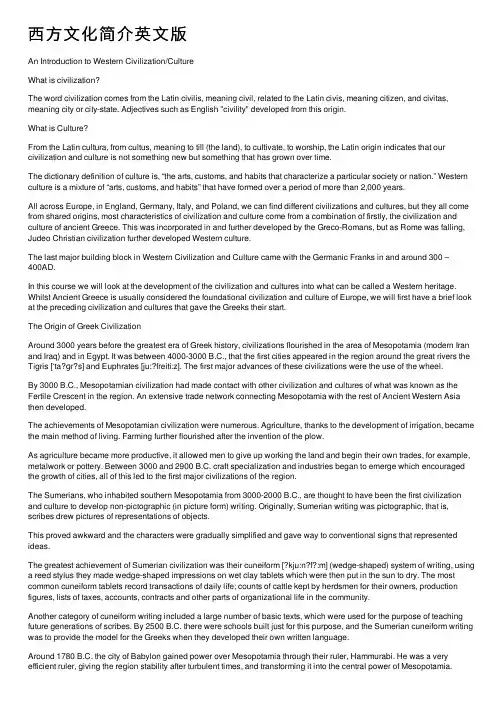
西⽅⽂化简介英⽂版An Introduction to Western Civilization/CultureWhat is civilization?The word civilization comes from the Latin civilis, meaning civil, related to the Latin civis, meaning citizen, and civitas, meaning city or city-state. Adjectives such as English "civility" developed from this origin.What is Culture?From the Latin cultura, from cultus, meaning to till (the land), to cultivate, to worship, the Latin origin indicates that our civilization and culture is not something new but something that has grown over time.The dictionary definition of culture is, “the arts, customs, and habits that characterize a particular society or nation.” Western culture is a mixture of “arts, customs, and habits” that have formed over a period of more than 2,000 years.All across Europe, in England, Germany, Italy, and Poland, we can find different civilizations and cultures, but they all come from shared origins, most characteristics of civilization and culture come from a combination of firstly, the civilization and culture of ancient Greece. This was incorporated in and further developed by the Greco-Romans, but as Rome was falling, Judeo Christian civilization further developed Western culture.The last major building block in Western Civilization and Culture came with the Germanic Franks in and around 300 –400AD.In this course we will look at the development of the civilization and cultures into what can be called a Western heritage. Whilst Ancient Greece is usually considered the foundational civilization and culture of Europe, we will first have a brief look at the preceding civilization and cultures that gave the Greeks their start.The Origin of Greek CivilizationAround 3000 years before the greatest era of Greek history, civilizations flourished in the area of Mesopotamia (modern Iran and Iraq) and in Egypt. It was between 4000-3000 B.C., that the first cities appeared in the region around the great rivers the Tigris [‘ta?ɡr?s] and Euphrates [ju:?freiti:z]. The first major advances of these civilizations were the use of the wheel.By 3000 B.C., Mesopotamian civilization had made contact with other civilization and cultures of what was known as the Fertile Crescent in the region. An extensive trade network connecting Mesopotamia with the rest of Ancient Western Asia then developed.The achievements of Mesopotamian civilization were numerous. Agriculture, thanks to the development of irrigation, became the main method of living. Farming further flourished after the invention of the plow.As agriculture became more productive, it allowed men to give up working the land and begin their own trades, for example, metalwork or pottery. Between 3000 and 2900 B.C. craft specialization and industries began to emerge which encouraged the growth of cities, all of this led to the first major civilizations of the region.The Sumerians, who inhabited southern Mesopotamia from 3000-2000 B.C., are thought to have been the first civilization and culture to develop non-pictographic (in picture form) writing. Originally, Sumerian writing was pictographic, that is, scribes drew pictures of representations of objects.This proved awkward and the characters were gradually simplified and gave way to conventional signs that represented ideas.The greatest achievement of Sumerian civilization was their cuneiform [?kju:n?f?:m] (wedge-shaped) system of writing, using a reed stylus they made wedge-shaped impressions on wet clay tablets which were then put in the sun to dry. The most common cuneiform tablets record transactions of daily life; counts of cattle kept by herdsmen for their owners, production figures, lists of taxes, accounts, contracts and other parts of organizational life in the community.Another category of cuneiform writing included a large number of basic texts, which were used for the purpose of teaching future generations of scribes. By 2500 B.C. there were schools built just for this purpose, and the Sumerian cuneiform writing was to provide the model for the Greeks when they developed their own written language.Around 1780 B.C. the city of Babylon gained power over Mesopotamia through their ruler, Hammurabi. He was a very efficient ruler, giving the region stability after turbulent times, and transforming it into the central power of Mesopotamia.A great literary revival followed Babylonian independence. One of the most important works of this era of Babylon was the writing of the first known code of laws called the ‘Code of Hammurabi.’ It focused on theft, farming (or shepherding), property damage, women’s righ ts, marriage rights, children’s rights, slave rights, murder, death, and injury. The punishment is different for different classes of offenders and victims.The city of Babylon also features in the Judeo Christian tradition. A story in the Bible is used by Jews and Christians to explain the existence of many different languages and races in the world. According to the biblical book of Genesis 11, at Babylon, humanity began building a ‘Tower of Babel’ in order to reach heaven and gain access to heaven directly from earth without the need of God. To prevent the project from succeeding, God made all the workers speak different new languages so that they could no longer communicate with one another and the work could not proceed, after that time, the people moved away to different parts of Earth, and spoke the different languages they had been given by God.From this story, and the city of Babylon, comes the modern English word babble, or talk in a confusing way. It is also due to the Babylonians that we have 60 seconds in a minute and 60 minutes in an hour. The mathematicians of Babylonia devised a system of counting based on the number 60, from which we get the number of seconds in a minute and of minutes in an hour and the number of degrees (60×6=360) in a circle. Mesopotamia ceased to be a major power after the conquest by Alexander the Great around 400 B.C.While the Sumerians and other groups were busy creating a Mesopotamian civilization, another civilization had appeared to the west. This civilization depended entirely on geography; it was the fertile valley of the Nile River that allowed Egyptian civilization to flourish over the course of many centuries.The art and science of engineering was greatly developed in Egypt, with their skill in surveying allowing them to accurately determine the position of points and the distances between them. These skills were used to outline the bases of the best known images of Ancient Egypt, the pyramids. The first pyramids, built around 2900 B.C., were little more than mud-brick structures, but the greatest building achievements in Egypt were the great pyramids of Giza, built more than 4500 years ago. The early civilizations of Mesopotamia and Egypt certainly could build pyramids, irrigation canals and pottery wheels, and develop cuneiform writing. They are not, however, considered the foundation of civilization and culture of Europe. Although civilization developed in the fertile crescent of Mesopotamia, it was in the civilizations bordering the Mediterranean that Western civilization and culture was truly born. It is the civilization and culture of Ancient Greece that is today seen as being the origin of Western civilization and culture.Ancient Greece is considered by most historians to be the foundational civilization and culture of Western civilization. Ancient Greek civilization has been immensely influential on the language, politics, educational systems, philosophy, art and architecture of the modern Western world.The period of Greek domination of the Mediterranean world lasted approximately 1,500 years from around 1600 BC until the coming of the Roman Empire, it should be noted, that we should not consider it to be one long uninterrupted rule, or that the Greeks were one group.The History of Greek CivilizationAegean Civilization3000-1450BC Minoan Civilization2000BC People from Mycenae went to Greece1600-1200BC Mycenae Civilization Ruled Greece1200-800BC Dark Period for Greece800-490BC The Archaic Period490-336BC The Classical Period336-30BC The Hellenistic Period146BC Greece was incorporated into RomeThe Rise and fall of Mycenaean PowerAt the height of its power, it was prosperous and active. They enlarged their cities, expanded their trade and sacked Troy. It was gone in 1100BC after the Troy War. The period from 1600 BC to about 1100 BC is known as Mycenaean [maisi?ni:?n] Greece after the major city of the period Mycenae.The age of Mycenae has given us the epic poem that has had a profound effect on the body of western literature and art. Transmitted to us through the Romans, the Renaissance and the following generations, this is the work of one author, the man who gave us the story about Troy.The period from which the story came, Mycenaean Greece, ended around 1100 BC, and the period from 1100 BC to around 800 BC is a ‘dark age’ of which little is known. In 800 BC Greece began to emerge from these Dark Ages, and at this time a written record begins to appear. This is the period most consider Classical Greece, but in those days there was no such political unit known as Greece. Greek geography, where every island, valley and plain is cut off from its neighbours by the sea or mountain ranges, dictated that Greece was divided into many small self-governing city communities.。
